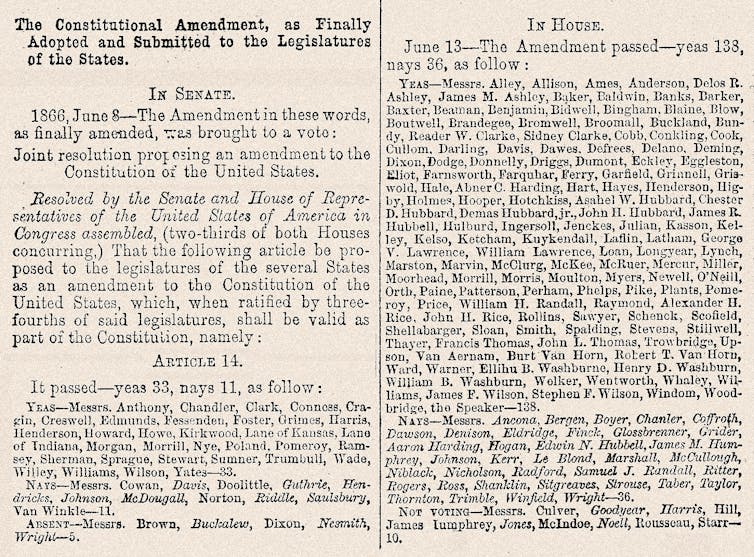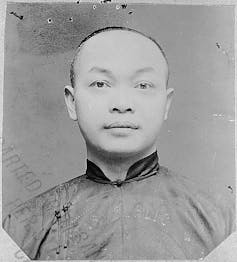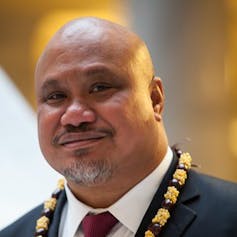As President-elect Donald J. Trump prepares to implement sweeping coverage adjustments affecting American immigration and immigrants, one of many points below scrutiny by his allies seems to be birthright citizenship – the declaration within the 14th Modification to the Structure that anybody born on U.S. soil is a U.S. citizen, no matter their mother and father’ nationalities or immigration standing.
Some potential members of Trump’s workforce, together with anti-immigration advisers Stephen Miller and Thomas Homan, have mentioned they intend to cease issuing federal identification paperwork comparable to Social Safety playing cards and passports to infants born within the U.S. to undocumented migrant mother and father, in accordance with The New York Occasions.
This primary step down a path to disclaim citizenship to some people born in the US displays a battle that’s been occurring for almost 200 years: who will get to be an American citizen.
Debates in American historical past over who will get citizenship and what sort of citizenship they get have all the time concerned questions of race and ethnicity, as we now have realized by way of our particular person analysis on the historic standing of Native Individuals and African Individuals and joint analysis on proscribing Chinese language immigration.
Nonetheless, even within the extremely racialized political surroundings of the late nineteenth century, the U.S. Supreme Court docket endorsed an expansive view of birthright citizenship. In an 1898 ruling, the court docket decreed that the U.S.-born youngsters of immigrants have been residents, no matter their mother and father’ ancestry.
That call set the phrases for the present controversy, as numerous Republican leaders, U.S. Sens. Tom Cotton of Arkansas and Marsha Blackburn of Tennessee, in addition to Vice President-elect JD Vance, have claimed that they may possess the ability to overturn greater than a century of federal constitutional regulation and coverage and deny birthright citizenship.
Citizenship by beginning
Dred Scott, round 1857, when he sued searching for freedom from slavery for himself, his spouse and their two youngsters.
Wikimedia Commons
Most residents of the U.S. are born, not made. Earlier than the Civil Battle, the U.S. had usually adopted the English follow of granting citizenship to youngsters born within the nation.
In 1857, although, the Supreme Court docket had determined the Dred Scott v. Sandford case, with Chief Justice Roger Taney declaring that folks of African descent residing within the U.S. – whether or not free or enslaved, and no matter the place they have been born – weren’t really U.S. residents.
After the Civil Battle, Congress explicitly rejected the Dred Scott determination, first by passing laws reversing the ruling after which by writing the 14th Modification to the Structure, which specified that “[a]ll persons born or naturalized in the United States, and subject to the jurisdiction thereof, are citizens of the United States and of the State wherein they reside.”
This broad language deliberately included extra than simply the individuals who had been free of slavery on the finish of the Civil Battle: Throughout legislative debate, members of Congress determined that the modification ought to cowl the kids of different nonwhite teams, comparable to Chinese language immigrants and people recognized on the time as “Gypsies.”

The Congressional File exhibits the Home and Senate votes on the 14th Modification.
Edward McPherson, Clerk of the Home of Representatives of the US/Wikimedia Commons
Nonetheless barring some folks from citizenship
This inclusive view of citizenship, nonetheless, nonetheless had an space judges hadn’t made clear but – the phrase “subject to the jurisdiction thereof.” In 1884, the Supreme Court docket needed to interpret these phrases when deciding the case of a Native American who needed to be a citizen, had renounced his tribal membership and tried to register to vote.
The justices dominated that although John Elk had been born within the U.S., he was born on a reservation as a member of a Native American tribe and was due to this fact topic to the tribe’s jurisdiction at his beginning – not that of the US. He was, they dominated, not a citizen.
In 1887, Congress did go a regulation making a path to citizenship for no less than some Native Individuals; it took till 1924 for all Native Individuals born on U.S. soil to be acknowledged as residents.

A U.S. immigration photograph of Wong Kim Ark, taken in 1904.
U.S. Nationwide Archives
The textual content of the 14th Modification additionally turned a problem within the late nineteenth century, when Congress and the Supreme Court docket have been deciding the way to deal with immigrants from China. An 1882 regulation had barred Chinese language immigrants residing within the U.S. from changing into naturalized residents. A California circuit court docket, nonetheless, dominated in 1884 that these immigrants’ U.S.-born youngsters have been residents.
In 1898, the Supreme Court docket took up the query in United States v. Wong Kim Ark, finally ruling that youngsters born within the U.S. have been, within the 14th Modification’s phrases, “subject to the jurisdiction” of the US, as long as their mother and father weren’t serving in some official capability as representatives of a overseas authorities and never a part of an invading military. These youngsters have been U.S. residents at beginning.
This ruling occurred close to the height of anti-Chinese language sentiment that had led Congress to endorse the concept that immigration itself may very well be unlawful. In earlier rulings, the court docket had affirmed broad powers for Congress to handle immigration and management immigrants.
But within the Wong Kim Ark ruling, the court docket didn’t point out any distinction between the kids of authorized immigrants and residents and the kids of people that have been in the US with out acceptable documentation. All folks born in the US have been robotically merely residents.
The lengthy attain of Wong Kim Ark

John Fitisemanu, born in American Samoa, was the lead plaintiff in a lawsuit searching for formal U.S. citizenship.
John Fitisemanu/Twitter
For the reason that Wong Kim Ark ruling, birthright citizenship guidelines haven’t modified a lot – however they’ve remained no much less contentious. In 1900 and 1904, leaders of a number of Pacific islands that make up what’s now American Samoa signed treaties granting the U.S. full powers and authority to manipulate them. These agreements, nonetheless, didn’t grant American Samoans citizenship.
A 1952 federal regulation and State Division coverage designates them as “non-citizen nationals,” which suggests they’ll freely reside and work within the U.S. however can not vote in state and federal elections.
In 2018, a number of plaintiffs from American Samoa sued to be acknowledged as U.S. residents, coated by the 14th Modification’s provision that they have been born “within” the U.S. and due to this fact residents. The district court docket discovered for the plaintiffs, however the tenth U.S. Circuit Court docket of Appeals reversed, ruling that Congress must act to increase citizenship to territorial residents.
A brand new debate has ignited over whether or not Congress has the ability to change birthright citizenship, and even over whether or not the president, both by way of an govt order or by way of directing the State Division to not acknowledge some people as residents, can change the boundaries round who will get to be a citizen. Efforts to change birthright citizenship are positive to impress authorized challenges.
Trump is simply the newest in a protracted line of politicians who’ve objected to the truth that Latin American immigrants who come to the U.S. with out authorized permission can have infants who’re U.S. residents. Most authorized students, even those that are fairly conservative, see little advantage in claims that the established guidelines will be altered.
At the very least till now, the courts have continued to uphold the centuries-long historical past of birthright citizenship, courting again to earlier than the Structure itself and early American court docket rulings. But when the Trump administration pursues the insurance policies that key figures have mentioned, the query appears more likely to attain the Supreme Court docket once more, with the basic precept hanging within the steadiness.
This text consists of materials beforehand revealed on Jan. 15, 2020.



